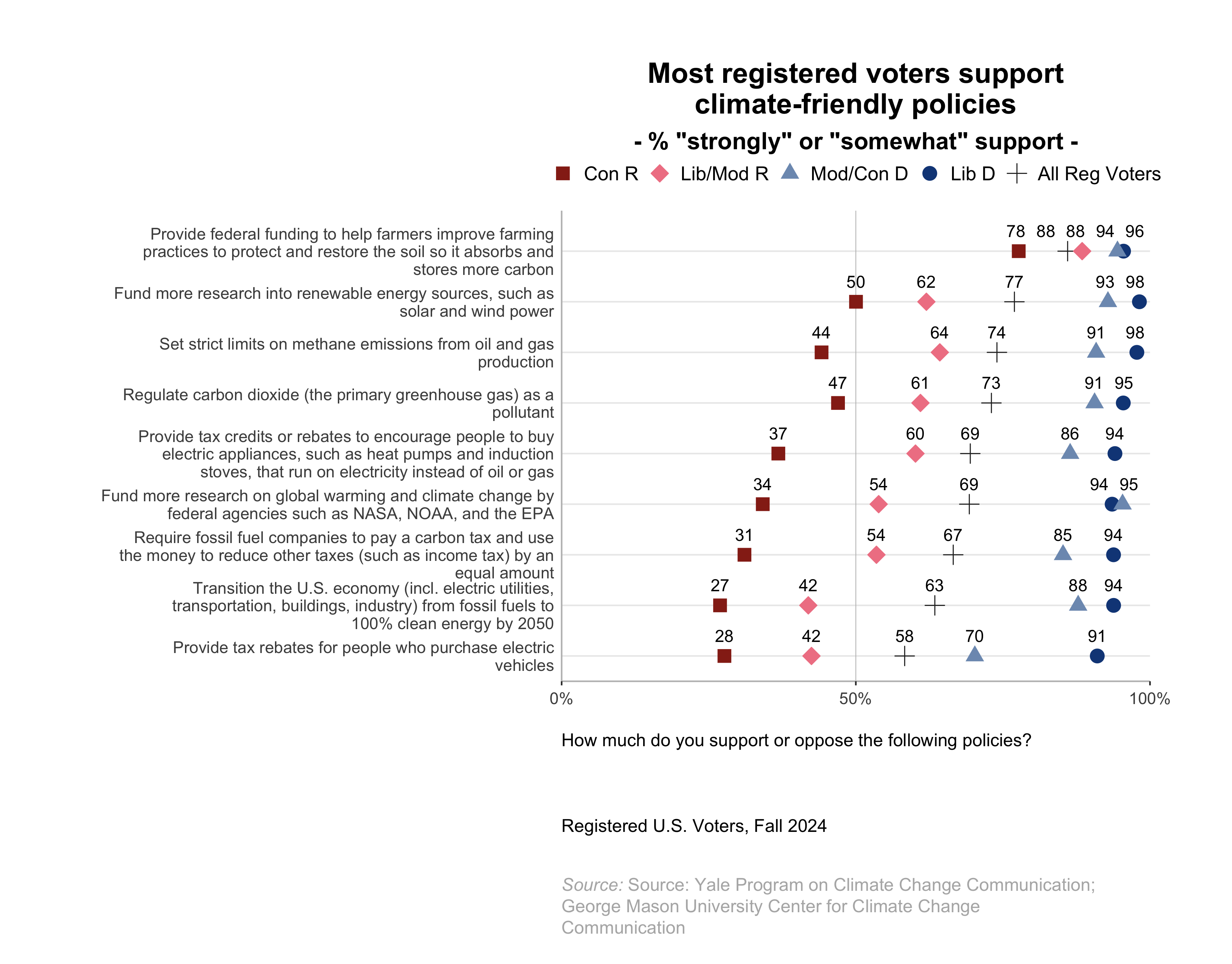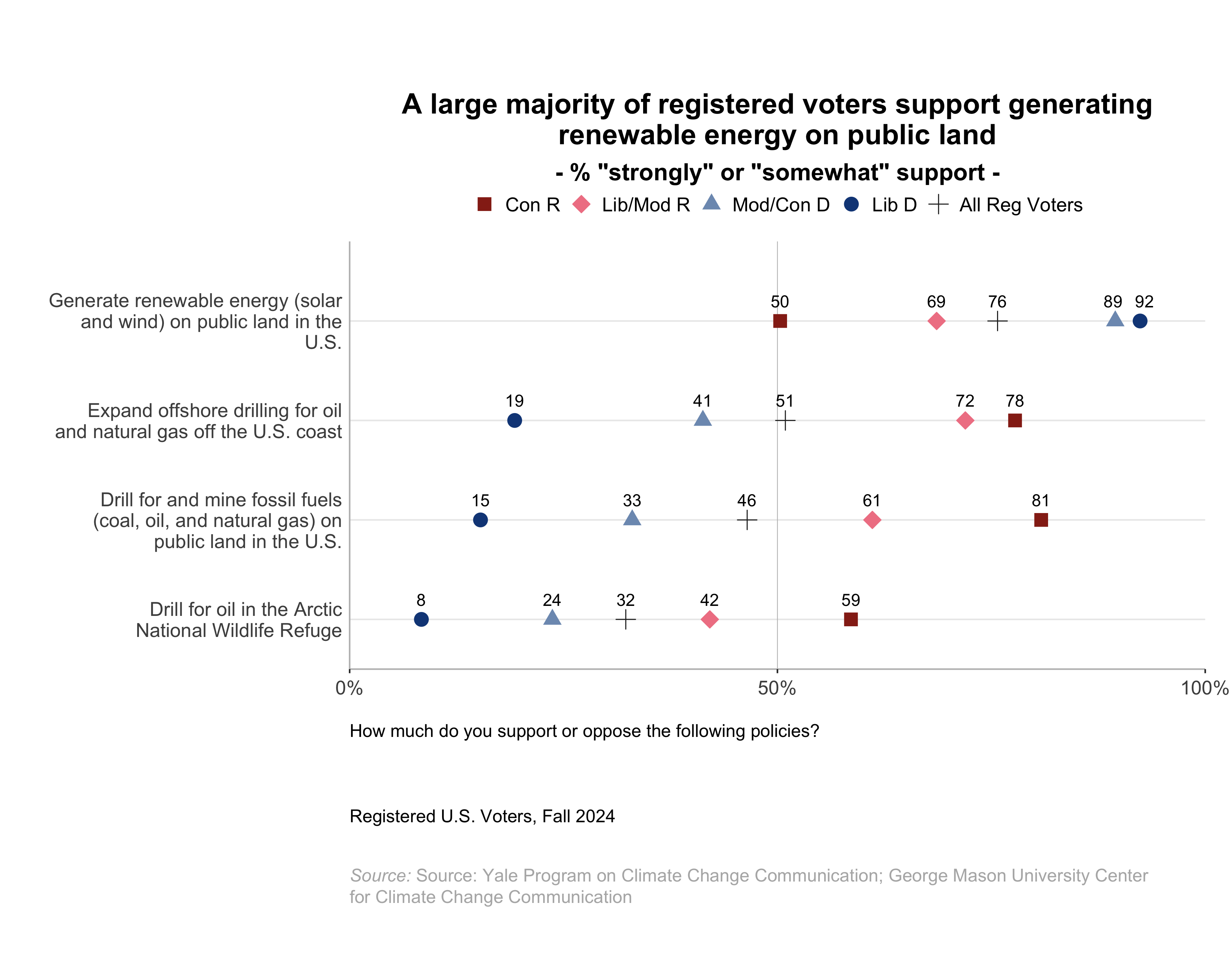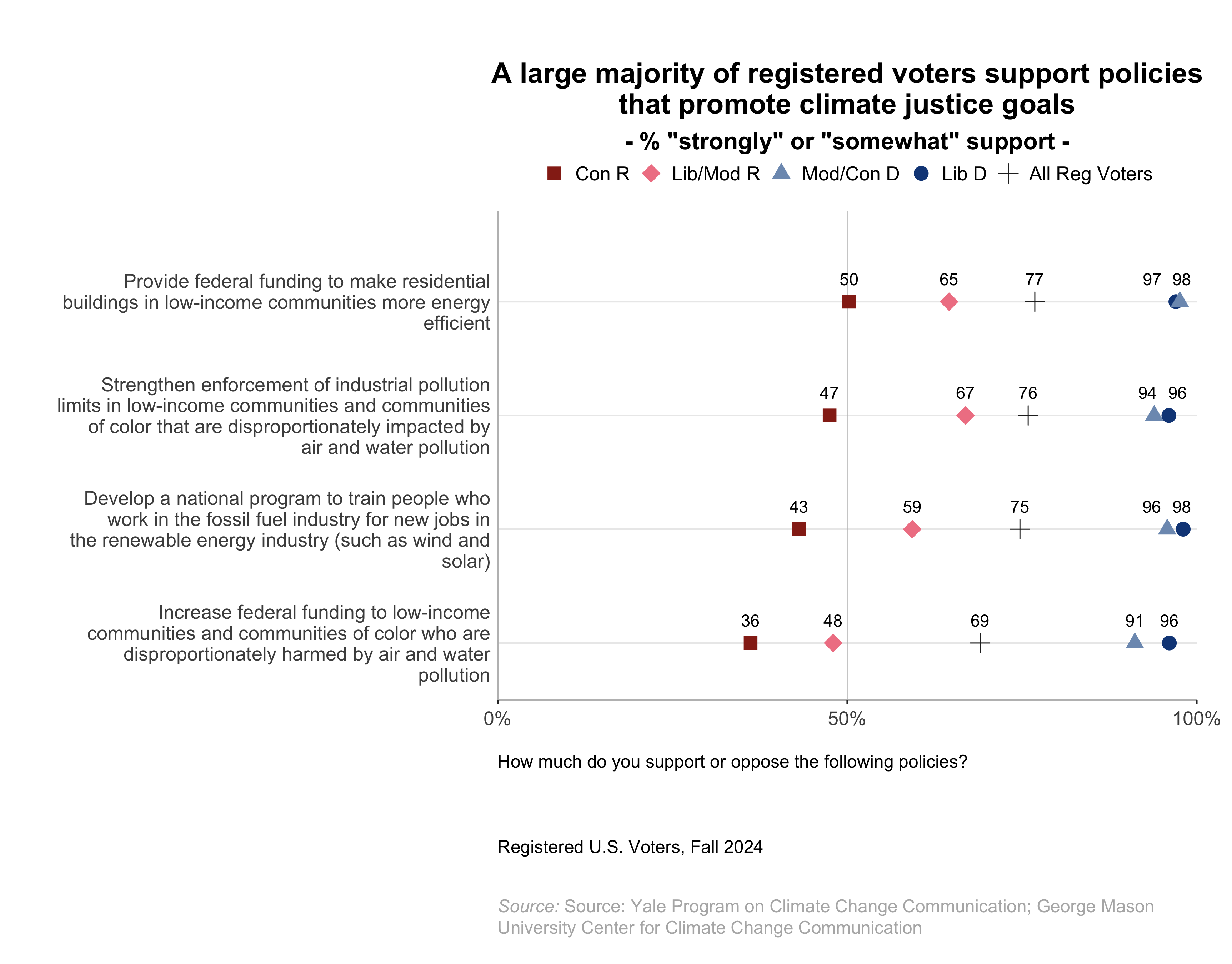Report · Jan 30, 2025
Climate Change in the American Mind: Politics & Policy, Fall 2024
By Anthony Leiserowitz, Edward Maibach, Seth Rosenthal, John Kotcher, Emily Goddard, Jennifer Carman, Teresa Myers, Marija Verner, Jennifer Marlon, Matthew Goldberg, Joshua Ettinger, Julia Fine and Kathryn Thier
Filed under: Policy & Politics
2. Support for Policies to Reduce the Pollution that Causes Global Warming
2.1 Most registered voters support climate-friendly policies.
Registered voters across the political spectrum support many policies designed to reduce carbon pollution and fossil fuel dependence and promote clean energy, including:
- Providing federal funding to help farmers improve practices to protect and restore the soil so it absorbs and stores more carbon: 88% of registered voters, including 96% of liberal Democrats, 94% of moderate/conservative Democrats, 88% of liberal/moderate Republicans, and 78% of conservative Republicans.
- Funding more research into renewable energy sources, such as solar and wind power: 77% of registered voters, including 98% of liberal Democrats, 93% of moderate/conservative Democrats, 62% of liberal/moderate Republicans, and 50% of conservative Republicans.
- Setting strict limits on methane emissions from oil and gas production: 74% of registered voters, including 98% of liberal Democrats, 91% of moderate/conservative Democrats, 64% of liberal/moderate Republicans, and 44% of conservative Republicans.
- Regulating carbon dioxide (the primary greenhouse gas) as a pollutant: 73% of registered voters, including 95% of liberal Democrats, 91% of moderate/conservative Democrats, 61% of liberal/moderate Republicans, and 47% of conservative Republicans.
- Providing tax credits or rebates to encourage people to buy electric appliances, such as heat pumps and induction stoves, that run on electricity instead of oil or gas: 69% of registered voters, including 94% of liberal Democrats, 86% of moderate/conservative Democrats, 60% of liberal/moderate Republicans, and 37% of conservative Republicans.
- Funding more research on global warming and climate change by federal agencies such as NASA, NOAA, and the EPA: 69% of registered voters, including 94% of liberal Democrats, 95% of moderate/conservative Democrats, 54% of liberal/moderate Republicans, and 34% of conservative Republicans.
- Requiring fossil fuel companies to pay a carbon tax and use the money to reduce other taxes (such as income tax) by an equal amount: 67% of registered voters, including 94% of liberal Democrats, 85% of moderate/conservative Democrats, 54% of liberal/moderate Republicans, and 31% of conservative Republicans.
- Transitioning the U.S. economy (including electric utilities, transportation, buildings, and industry) from fossil fuels to 100% clean energy by 2050: 63% of registered voters, including 94% of liberal Democrats, 88% of moderate/conservative Democrats, 42% of liberal/moderate Republicans, and 27% of conservative Republicans.
- Providing tax rebates for people who purchase electric vehicles: 58% of registered voters, including 91% of liberal Democrats, 70% of moderate/conservative Democrats, 42% of liberal/moderate Republicans, and 28% of conservative Republicans.
2.2 A large majority of registered voters support generating renewable energy on public land.
A large majority of registered voters (76%) support generating renewable energy (solar and wind) on public land in the United States. This includes a large majority of liberal Democrats (92%) and moderate/conservative Democrats (89%) as well as a majority of liberal/moderate Republicans (69%) and half of conservative Republicans (50%).
Fewer registered voters support fossil-fuel production in the United States, including:
- Expanding offshore drilling for oil and natural gas off the U.S. coast: 51% of registered voters; 78% of conservative Republicans, 72% of liberal/moderate Republicans, 41% of moderate/conservative Democrats, and 19% of liberal Democrats.
- Drilling for and mining fossil fuels (coal, oil, and natural gas) on public land in the U.S.: 46% of registered voters; 81% of conservative Republicans, 61% of liberal/moderate Republicans, 33% of moderate/conservative Democrats, and 15% of liberal Democrats.
- Drilling for oil in the Arctic National Wildlife Refuge: 32% of registered voters; 59% of conservative Republicans, 42% of liberal/moderate Republicans, 24% of moderate/conservative Democrats, and 8% of liberal Democrats.
2.3 A large majority of registered voters support policies that promote climate justice goals.
A large majority of registered voters across the political spectrum support a variety of policies that promote climate justice goals, including the following:
- Providing federal funding to make buildings in low-income communities more energy efficient: 77% of registered voters, including 97% of liberal Democrats, 98% of moderate/conservative Democrats, 65% of liberal/moderate Republicans, and 50% of conservative Republicans.
- Strengthening enforcement of industrial pollution limits in low-income communities and communities of color that are disproportionately impacted by air and water pollution: 76% of registered voters, including 96% of liberal Democrats, 94% of moderate/conservative Democrats, 67% of liberal/moderate Republicans, and 47% of conservative Republicans.
- Developing a national program to train people who work in the fossil fuel industry for new jobs in the renewable energy industry (such as wind and solar): 75% of registered voters, including 98% of liberal Democrats, 96% of moderate/conservative Democrats, 59% of liberal/moderate Republicans, and 43% of conservative Republicans.
- Increasing federal funding to low-income communities and communities of color who are disproportionately impacted by air and water pollution: 69% of registered voters, including 96% of liberal Democrats, 91% of moderate/conservative Democrats, 48% of liberal/moderate Republicans, and 36% of conservative Republicans.


